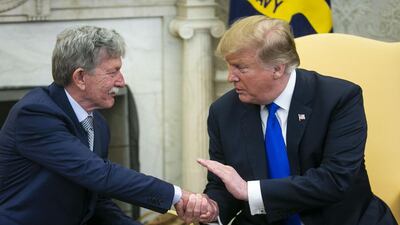US President Donald Trump's "unparalleled success" in releasing American hostages has nothing to do with paying ransoms or exchanging prisoners, but through the sheer "force of will" and goodwill that he has generated from around the world, his special envoy for hostage affairs said on Wednesday.
Speaking at an Oval Office greeting with Danny Burch, an American oil worker who spent 18 months as a hostage to the Houthi rebels in Yemen, Mr Trump indicated there are more negotiations going on.
The US President said he loved releasing hostages because of the "end result: a happy man with a happy family".
"The President has had unparalleled success in bringing Americans home without paying concessions, without prisoner exchanges, but through force of will and the goodwill that he’s generated around the world," the Special Presidential Envoy for Hostage Affairs, Robert O'Brien said, according to the official transcript.
Mr Burch's release, which was negotiated with the help of the UAE, is part of a wider effort by Mr Trump to secure the release of hostages, it was claimed.
Mr Trump said his administration was "20 and 0" in releasing hostages, touting the release of hostages in Egypt and North Korea and promising more.
"I won’t tell you where [the US has other negotiations going on] because we don’t want to blow the negotiation out the window," Mr Trump said, adding that he loved reuniting families.
"This is the end result: a happy man with a happy family," he said.
The exact number of American citizens held overseas is classified information, but during Mr Trump's presidency hostages from North Korea, Pakistan and Egypt have been released.
"Recovering American hostages is a priority of my Admin, and with Danny’s release, we have now secured freedom for 20 American captives since my election victory," Mr Trump tweeted last month, announcing Mr Burch's release.
"We will not rest as we continue our work to bring the remaining American hostages back home," he said.
There are still US hostages held by Iran, the Pakistani Haqqani network and in Syria, according to the James Foley Foundation, an organisation that monitors and advocates for the release of American hostages.
But while Mr Trump is claiming credit for an increase in the number of hostages being released, his success stems from Obama Administration reforms.
In 2015, a series of high-profile cases of American hostages being executed in captivity and dissatisfaction between the families of the hostages and the US State Department, especially compared to European countries who pay ransom for hostages, led to an Obama Administration effort to bring hostages home.
The first Special Presidential Envoy for Hostage Affairs was appointed by former President Barack Obama as part of an effort to bring hostages home. The appointment coincided with the creation of the Hostage Recovery Fusion Cell in the FBI and a Hostage Response Group in the National Security Council.
More than 180 US citizens have been freed since the White House established the Hostage Recovery Fusion Cell in June 2015, according to an FBI press release. The aim of the reforms was to allow the US government to speak with a single voice, instead of a situation where the State Department, Defence Department and FBI ran competing operations.
While the Obama reforms provided the framework for improved hostage recovery, Mr Trump's prioritisation of the issue has helped the US efforts to improve, Jeff Dubel, the former Deputy Director of the Hostage Recovery Fusion Cell (HRFC) told The National.
“There was an increased focus on the recovery of hostages under Obama and a priority of effort and focus under Trump,” Mr Dubel, who was a part of the cell from the Obama administration’s review, until he retired last month said.
“All for the better, I’m extremely proud of my time setting up the HRFC because it works and continues to get better,” he added.
Mr Trump previously criticised the Obama administration's negotiated release of Bowe Bergdahl, a US soldier captured by the Pakistan Haqqani network, branding Mr Bergdahl a "no-good traitor who should have been executed."
Otto Warmbier, an American student held in North Korea was released by the Trump Administration in 2017, but died shortly after arriving in the United States, thought to be a result of his treatment.
Last week, at a conference with North Korea's Supreme Leader Kim Jong-un, Mr Trump said he did not believe the leader was responsible for Warmbier's death.

